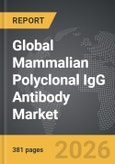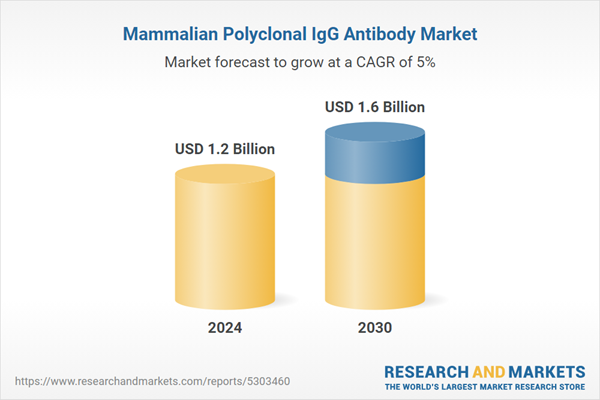Global Mammalian Polyclonal IgG Antibody Market - Key Trends and Drivers Summarized
How Are Mammalian Polyclonal IgG Antibodies Vital to Biomedical Research?
Mammalian polyclonal IgG antibodies are essential tools in biomedical research, diagnostics, and therapeutics. These antibodies are produced by immunizing mammals (such as rabbits, goats, or mice) with a specific antigen, resulting in a diverse population of antibodies that target different epitopes of the antigen. Polyclonal IgG antibodies are widely used in immunoassays, such as ELISA and Western blotting, to detect proteins, pathogens, and other biomolecules. Their ability to recognize multiple epitopes makes them valuable for capturing target antigens with high sensitivity. Additionally, polyclonal antibodies are utilized in therapeutic applications, particularly in treatments that require broad-spectrum immune responses.What Innovations Are Shaping the Mammalian Polyclonal IgG Antibody Market?
Advancements in antibody production technologies and genetic engineering are driving innovations in the mammalian polyclonal IgG antibody market. New techniques such as recombinant antibody production and affinity purification are improving the quality and specificity of antibodies, allowing for more reliable and reproducible research outcomes. Additionally, the use of genetically modified animals is enabling the production of polyclonal antibodies with enhanced efficacy and reduced immunogenicity. The development of novel adjuvants and immunization protocols is also improving antibody yields, making it easier for researchers and pharmaceutical companies to obtain high-quality antibodies for use in diagnostics and therapies.How Do Market Segments Define the Growth of Mammalian Polyclonal IgG Antibodies?
Species types include rabbit, goat, mouse, and others, with rabbit polyclonal antibodies dominating the market due to their high affinity and broad application range. Applications include diagnostics, research, and therapeutic use, with research laboratories being the largest segment as polyclonal antibodies are commonly used in immunoassays. End-use industries include pharmaceutical companies, academic research institutions, and biotechnology firms, with pharmaceutical companies driving significant demand for polyclonal antibodies in drug development and clinical trials.What Factors Are Driving the Growth in the Mammalian Polyclonal IgG Antibody Market?
The growth in the mammalian polyclonal IgG antibody market is driven by several factors, including the increasing demand for immunoassays in diagnostics, advancements in antibody production technologies, and the growing use of polyclonal antibodies in therapeutic applications. As the field of biomedical research continues to expand, the need for high-quality antibodies to detect and quantify specific proteins and pathogens is growing. Additionally, the rise of personalized medicine and targeted therapies is fueling demand for polyclonal antibodies in drug discovery and development. The increasing prevalence of infectious diseases and cancer is also driving the adoption of polyclonal antibodies in diagnostic and therapeutic settings.Report Scope
The report analyzes the Mammalian Polyclonal IgG Antibody market, presented in terms of market value (US$ Thousand). The analysis covers the key segments and geographic regions outlined below.- Segments: Product (Metabolic Markers, Cardiac Markers, Renal Markers, Other Products); Application (Western Blotting, ELISA, Immunoturbidometry, Immunoelectrophoresis, Antibody Identification, Immunohistochemistry, Immunocytochemistry); End-Use (Diagnostic Centers, Hospitals, Academic & Research Institutes).
- Geographic Regions/Countries:World; United States; Canada; Japan; China; Europe (France; Germany; Italy; United Kingdom; Spain; Russia; and Rest of Europe); Asia-Pacific (Australia; India; South Korea; and Rest of Asia-Pacific); Latin America (Argentina; Brazil; Mexico; and Rest of Latin America); Middle East (Iran; Israel; Saudi Arabia; United Arab Emirates; and Rest of Middle East); and Africa.
Key Insights:
- Market Growth: Understand the significant growth trajectory of the Metabolic Markers segment, which is expected to reach US$532.1 Million by 2030 with a CAGR of a 5.7%. The Cardiac Markers segment is also set to grow at 5.1% CAGR over the analysis period.
- Regional Analysis: Gain insights into the U.S. market, valued at $315.9 Million in 2024, and China, forecasted to grow at an impressive 8.2% CAGR to reach $381.8 Million by 2030. Discover growth trends in other key regions, including Japan, Canada, Germany, and the Asia-Pacific.
Why You Should Buy This Report:
- Detailed Market Analysis: Access a thorough analysis of the Global Mammalian Polyclonal IgG Antibody Market, covering all major geographic regions and market segments.
- Competitive Insights: Get an overview of the competitive landscape, including the market presence of major players across different geographies.
- Future Trends and Drivers: Understand the key trends and drivers shaping the future of the Global Mammalian Polyclonal IgG Antibody Market.
- Actionable Insights: Benefit from actionable insights that can help you identify new revenue opportunities and make strategic business decisions.
Key Questions Answered:
- How is the Global Mammalian Polyclonal IgG Antibody Market expected to evolve by 2030?
- What are the main drivers and restraints affecting the market?
- Which market segments will grow the most over the forecast period?
- How will market shares for different regions and segments change by 2030?
- Who are the leading players in the market, and what are their prospects?
Report Features:
- Comprehensive Market Data: Independent analysis of annual sales and market forecasts in US$ Million from 2024 to 2030.
- In-Depth Regional Analysis: Detailed insights into key markets, including the U.S., China, Japan, Canada, Europe, Asia-Pacific, Latin America, Middle East, and Africa.
- Company Profiles: Coverage of players such as Abbiotec, Inc., Advy Chemical Pvt. Ltd., BioNTech, Abcam plc, Bio-Rad Laboratories, Inc. and more.
- Complimentary Updates: Receive free report updates for one year to keep you informed of the latest market developments.
Some of the 33 companies featured in this Mammalian Polyclonal IgG Antibody market report include:
- Abbiotec, Inc.
- Advy Chemical Pvt. Ltd.
- BioNTech
- Abcam plc
- Bio-Rad Laboratories, Inc.
- Cell Signaling Technology, Inc.
- Cloud-clone corp.
- Creative Diagnostics
- Enzo Life Sciences, Inc.
- F. Hoffmann-La Roche Ltd
- FiberCell Laboratories
- Geno Technology Inc.
- Genway Biotech, Inc.
- LigaTrap
- Merck KGaA
- Phoenix Pharmaceuticals
- Proteintech Group
- Sino Biological Inc.
- Stemcell Technologies Inc.
- Thermo Fisher Scientific Inc.
- ViroGen
This edition integrates the latest global trade and economic shifts into comprehensive market analysis. Key updates include:
- Tariff and Trade Impact: Insights into global tariff negotiations across 180+ countries, with analysis of supply chain turbulence, sourcing disruptions, and geographic realignment. Special focus on 2025 as a pivotal year for trade tensions, including updated perspectives on the Trump-era tariffs.
- Adjusted Forecasts and Analytics: Revised global and regional market forecasts through 2030, incorporating tariff effects, economic uncertainty, and structural changes in globalization. Includes historical analysis from 2015 to 2023.
- Strategic Market Dynamics: Evaluation of revised market prospects, regional outlooks, and key economic indicators such as population and urbanization trends.
- Innovation & Technology Trends: Latest developments in product and process innovation, emerging technologies, and key industry drivers shaping the competitive landscape.
- Competitive Intelligence: Updated global market share estimates for 2025, competitive positioning of major players (Strong/Active/Niche/Trivial), and refined focus on leading global brands and core players.
- Expert Insight & Commentary: Strategic analysis from economists, trade experts, and domain specialists to contextualize market shifts and identify emerging opportunities.
Table of Contents
Companies Mentioned (Partial List)
A selection of companies mentioned in this report includes, but is not limited to:
- Abbiotec, Inc.
- Advy Chemical Pvt. Ltd.
- BioNTech
- Abcam plc
- Bio-Rad Laboratories, Inc.
- Cell Signaling Technology, Inc.
- Cloud-clone corp.
- Creative Diagnostics
- Enzo Life Sciences, Inc.
- F. Hoffmann-La Roche Ltd
- FiberCell Laboratories
- Geno Technology Inc.
- Genway Biotech, Inc.
- LigaTrap
- Merck KGaA
- Phoenix Pharmaceuticals
- Proteintech Group
- Sino Biological Inc.
- Stemcell Technologies Inc.
- Thermo Fisher Scientific Inc.
- ViroGen
Table Information
| Report Attribute | Details |
|---|---|
| No. of Pages | 381 |
| Published | February 2026 |
| Forecast Period | 2024 - 2030 |
| Estimated Market Value ( USD | $ 1.2 Billion |
| Forecasted Market Value ( USD | $ 1.6 Billion |
| Compound Annual Growth Rate | 5.0% |
| Regions Covered | Global |









